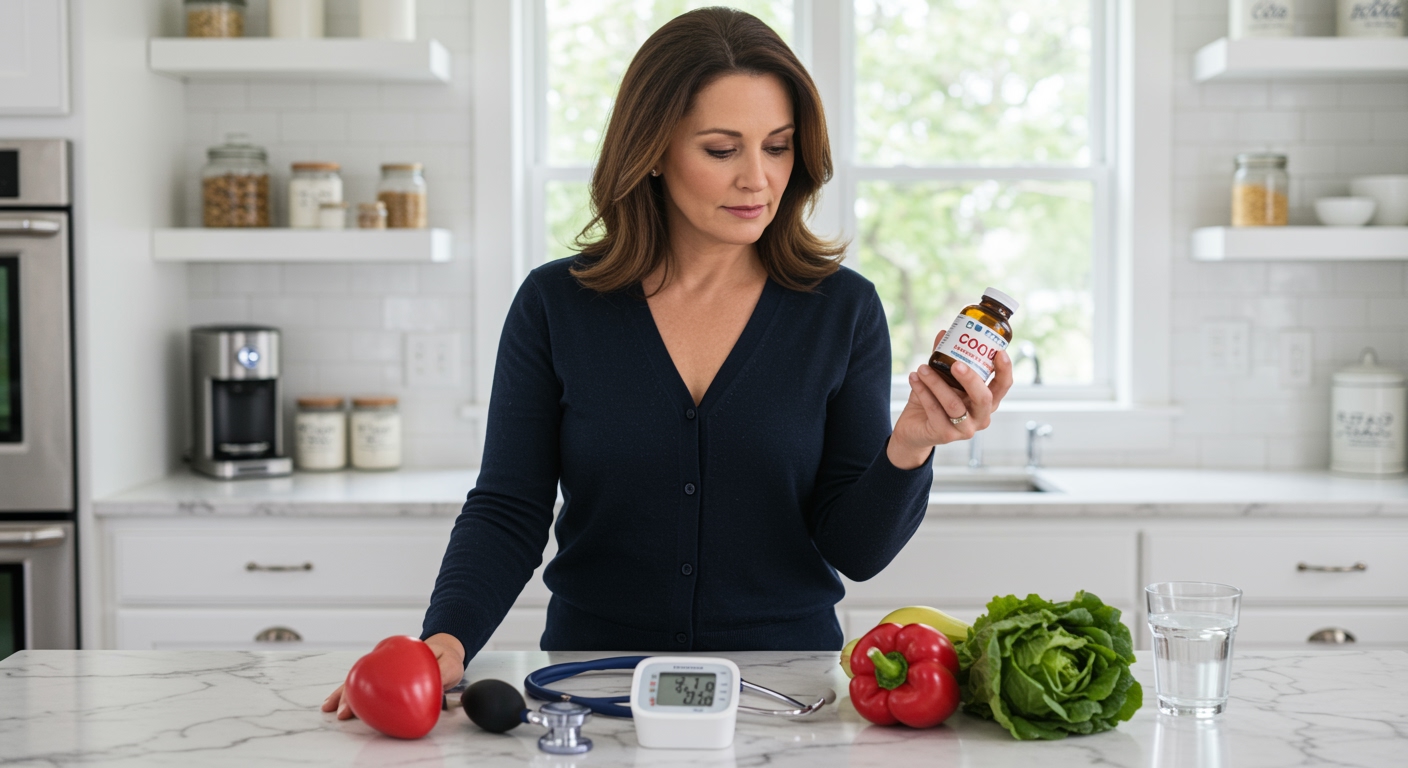✪ Key Takeaway: CoQ10 may modestly reduce blood pressure by 4-11 mmHg, but evidence remains mixed and effects vary significantly between individuals.
Introduction
Your doctor just told you that your blood pressure is too high, and now you are searching for natural solutions.
You have probably heard about CoQ10 supplements and wonder if they could help lower your numbers without adding another prescription medication to your daily routine.
Hi, I am Abdur, your nutrition coach, and today I am going to explain exactly what the research shows about CoQ10 and blood pressure so you can make an informed decision.
What Is CoQ10 and How Does It Work?
Coenzyme Q10 is a compound that your body naturally produces in every cell.
It plays a crucial role in energy production within your mitochondria, which are the powerhouses of your cells.
Your heart muscle requires enormous amounts of energy to pump blood throughout your body every single day.
As you age, your natural CoQ10 levels decline significantly, dropping by about 50% between ages 20 and 80.
This reduction may contribute to decreased heart function and potentially higher blood pressure readings.
CoQ10 also acts as a powerful antioxidant, protecting your blood vessels from damage caused by free radicals.
When your blood vessels are healthier, they can relax more easily, which may help reduce the pressure needed to pump blood through them.
✪ Fact: Your heart contains the highest concentration of CoQ10 in your entire body due to its massive energy demands.
What Does the Research Actually Show?
Multiple studies have examined CoQ10 supplementation for blood pressure reduction with mixed results.
A comprehensive review of 12 clinical trials found that CoQ10 supplementation reduced systolic blood pressure by an average of 11 mmHg and diastolic pressure by 7 mmHg.
However, these results varied dramatically between different studies, with some showing no effect at all.
One well-designed study involving 74 people with diabetes found that 200mg of CoQ10 daily for 12 weeks reduced systolic pressure by 6 mmHg compared to placebo.
Another study with 83 participants showed reductions of 4-11 mmHg in systolic pressure after taking CoQ10 for 10 weeks.
The challenge is that many studies used different dosages, treatment durations, and participant groups, making it difficult to draw definitive conclusions.
Most positive results occurred in people who already had high blood pressure rather than those with normal readings.
✪ Note: Studies showing the most promising results typically used doses between 100-300mg daily for at least 8 weeks.
Who Might Benefit Most From CoQ10?
Not everyone responds equally to CoQ10 supplementation for blood pressure management.
People taking statin medications may see the greatest benefits because these drugs significantly reduce natural CoQ10 production.
If you are over 50 years old, your declining CoQ10 levels might make supplementation more effective than it would be for younger individuals.
Those with heart failure or other cardiovascular conditions often have lower CoQ10 levels and may respond better to supplementation.
People with diabetes appear to benefit more from CoQ10 supplementation, possibly because diabetes can impair natural CoQ10 production.
However, if you already have normal blood pressure, CoQ10 is unlikely to provide additional benefits.
The supplement seems most effective when your blood pressure readings are consistently above 140/90 mmHg.
✪ Pro Tip: Check with your doctor about CoQ10 testing to determine if your levels are actually low before starting supplementation.
What Are the Limitations and Side Effects?
CoQ10 supplementation comes with several important limitations you should understand.
The blood pressure reductions, when they occur, are typically modest and may not be sufficient as a standalone treatment for high blood pressure.
CoQ10 supplements are expensive, and you need to take them consistently for at least 8-12 weeks to see any potential benefits.
The supplement can interact with blood-thinning medications like warfarin, potentially affecting your clotting times.
Common side effects include stomach upset, nausea, diarrhea, and headaches, especially when starting supplementation.
Some people experience insomnia if they take CoQ10 late in the day because it can increase energy levels.
The quality of CoQ10 supplements varies significantly between manufacturers, and the body absorbs different forms at different rates.
✪ Note: Always take CoQ10 with a meal containing fat to improve absorption, as it is a fat-soluble compound.
Should You Try CoQ10 for Blood Pressure?
The decision to try CoQ10 depends on your individual circumstances and realistic expectations.
If you are taking statin medications or have documented low CoQ10 levels, supplementation may provide modest blood pressure benefits.
However, CoQ10 should never replace proven blood pressure treatments like lifestyle changes or prescribed medications.
The most effective approach combines proper nutrition, regular exercise, stress management, and appropriate medical treatment when necessary.
If you decide to try CoQ10, start with 100-200mg daily and monitor your blood pressure regularly to track any changes.
Give the supplement at least 8-12 weeks to work, as CoQ10 builds up slowly in your tissues.
Remember that maintaining a healthy weight, eating plenty of vegetables, limiting sodium, and staying physically active will likely have much greater impacts on your blood pressure than any single supplement.
✪ Pro Tip: Keep a blood pressure log to objectively track whether CoQ10 supplementation is actually helping your numbers.
The Bottom Line
CoQ10 may provide modest blood pressure reductions in some people, particularly those taking statins or with existing cardiovascular conditions, but the evidence remains inconsistent.
Supplements are tools, not magic bullets – your daily habits will always matter more than any pill you take.
I would love to hear about your experiences with CoQ10 or any questions you have about natural approaches to blood pressure management in the comments below.
References
At NutritionCrown, we use quality and credible sources to ensure our content is accurate and trustworthy. Below are the sources referenced in creating this article:
- PMC: Coenzyme Q10 and Cardiovascular Health
- PubMed: Coenzyme Q10 in the treatment of hypertension
- Cleveland Clinic Journal: Coenzyme Q10 and cardiovascular disease
- Nature: Effect of coenzyme Q10 on blood pressure
- PMC: Coenzyme Q10 supplementation and heart failure





